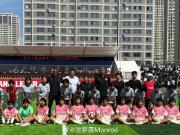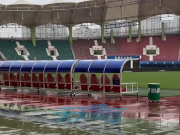张稀哲的狼堡淬炼与未竟之梦】
更新时间:
The European adventure, a dream for countless aspiring footballers, often begins with hope, yet frequently concludes with quiet contemplation of what might have been. For a young Chinese talent, the journey is doubly fraught, navigating not just tactical complexities, but a labyrinth of cultural, linguistic, and deeply personal adjustments. Zhang Xizhe's brief sojourn in Wolfsburg, while not yielding on-field glory, stands as a poignant case study in the harsh realities of the global game, a chapter rich with unseen struggles and invaluable, albeit unconventional, lessons that resonate years later.
Picture a German training ground: crisp air, rhythmic thud of footballs, sleek modern facilities. Day in, day out, relentless drills, intricate tactics, grueling fitness. Yet, for Zhang Xizhe, this wasn't the vibrant build-up to a weekend clash. It was a silent purgatory of perpetual preparation, tethered to the reserve squad, a specter of the first team, ever present but out of reach. Six months stretched into an eternity, each session a stark reminder of the chasm between ambition and opportunity. The emotional toll of a professional denied competitive play is immense; a gnawing impotence amidst the grand, indifferent machinery of top-tier European football.
Even in this crucible of frustration, genuine growth was forged, unconventionally. The training pitch, despite lacking match-day payoff, transformed into an impromptu, high-stakes classroom. He recalled a distinct shift: from an environment with perhaps one exceptional talent, to a Wolfsburg dressing room boasting a constellation of stars—five, six, even seven world-beaters. These were not just figures on a screen, but living examples of elite athleticism and tactical acumen. Proximity to such elevated skill, unspoken communication, subtle nuances of movement, decision-making, and anticipation—these became lessons absorbed through pure osmosis, a curriculum delivered by the feet of masters.
And then, there was Kevin De Bruyne. Years later, the memory of his passes remains vivid, a testament to true footballing genius. Most players execute a pass, acknowledging its efficacy. But De Bruyne possesses that rare, alchemical ability to redefine the very concept. His deliveries weren't merely accurate; they were visionary, often eliciting that involuntary gasp, "How did he even *see* that? How did he *imagine* that trajectory?" It’s a distinction separating the very good from the truly sublime, a capacity to bend the game to one's will, to conjure possibilities where others perceive only dead ends. To witness that daily, to train alongside such unparalleled creativity, leaves an indelible mark on any player's development.
Why, then, did the on-field breakthrough remain so stubbornly elusive? It’s a question often posed to Asian players in Europe, and the answer is rarely simplistic. Zhang Xizhe himself offered candid insight: the initial language barrier, profound unfamiliarity with teammates' styles, the subtle yet pervasive cultural shifts—these are not minor hurdles. They are formidable, multi-layered walls, requiring considerable time and sustained effort. He astutely recognized he wasn't a generational talent acquired for a princely sum, earmarked for immediate stardom. For players in his position, the acclimatization period is crucial; a minimum of a year, perhaps more, is often required to truly integrate, understand rhythms, and then showcase their best. To expect instant assimilation and impactful performances in a league as rigorous as the Bundesliga can be an unrealistic burden.
The narrative takes a particularly poignant turn with the infamous "car show" incident. It represents a nadir, a moment where conflicting priorities of club, player, and commercial interests brutally collided. For a dedicated professional, being summoned away from training and competition for a commercial obligation, particularly one so 标签:

上一篇
勒沃库森深度参与中国体教融合新篇章

下一篇
河南国安大战前雨势搅局